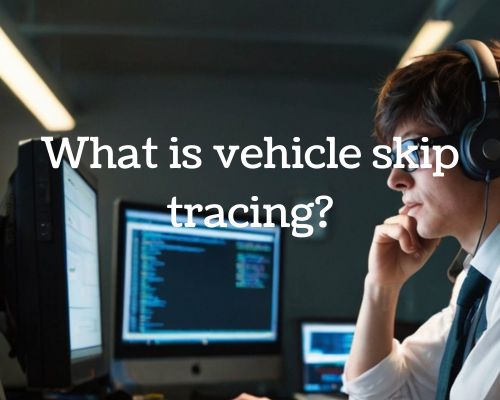Vehicle skip tracing is a specialized process used to locate and recover vehicles when standard methods fall short.
At its core, it involves gathering and analyzing information to track down vehicles that are difficult to find, often due to delinquent loans or repossession orders.

By employing data collection and analysis techniques, you can effectively identify the location of a vehicle, even if it’s hidden or deliberately moved.
In today’s world, vehicle skip tracing has become more efficient due to access to vast databases and sophisticated technology.
You might utilize public and private records, GPS data, and even insights from social connections to trace a vehicle. This process is invaluable for lending institutions, recovery agencies, and others needing to reclaim assets.
Understanding the nuances of vehicle skip tracing can also offer insights into the complexities of asset recovery in the modern age.
“As you explore these methods, the broader implications of privacy, legality, and technology often surface, adding layers of intrigue and challenge to the field.” said Charles Jimerson from Private Investigator West Palm Beach.
Understanding Vehicle Skip Tracing
Vehicle skip tracing is an essential technique for locating vehicles and their owners.
By collecting various data points like registration details and contact information, skip tracers operate within ethical and legal standards to retrieve necessary information.
Basics of Skip Tracing
Skip tracing involves gathering information from diverse data sources to locate a vehicle or its owner.
Key methods include phone lookup, address search, and analyzing public records.
Skip tracers use advanced search criteria to cross-reference data, such as name searches and vehicle registrations.
The technology applied can include specialized software and services that facilitate efficient data collection and analysis. See Charles Jimerson from Private Investigator West Palm Beach for more.
Legal Framework and Privacy
Understanding the legalities surrounding vehicle skip tracing is crucial.
Compliance with laws like the Fair Credit Reporting Act and Fair Debt Collection Practices Act is mandatory.
These laws uphold privacy rights and regulate how personal data is accessed and used.
You must ensure that ethical considerations are prioritized, respecting data privacy and privacy laws to avoid legal troubles.
The Skip Tracing Process
The process starts with information gathering, where skip tracers collect as much data as possible.
This can involve online research and background checks to build a complete profile.
Effective skip tracing techniques include verifying information through reliable sources to confirm accuracy.
Skip tracing services often employ a variety of tools, including verification services, to assist in confirming the gathered data.
The Role of Professionals and Technology in Skip Tracing
In vehicle skip tracing, professionals use advanced technologies to locate individuals and gather essential data. Various roles and technological tools contribute to the efficiency and effectiveness of the process.
Key Professionals in Skip Tracing
Professionals like private investigators, debt collectors, and repossession agents play a crucial role in skip tracing, utilizing their expertise to find individuals and collect data.
Repossession agents often use vehicle skip tracing to locate and recover vehicles tied to delinquent payments.
Bounty hunters and bail bondsmen are also involved when individuals evade the law, leveraging contact information and criminal background checks to track down subjects.
To enhance accuracy, these professionals collaborate with law enforcement or work independently to manage their assignments effectively.
Technological Tools and Databases
Modern skip tracing relies heavily on technology, employing tools such as skip tracing software, batch skip tracing, and specialized databases.
These tools help professionals gather and analyze data like phone numbers, email addresses, and social profiles.
Specialized databases contain phone number records, property records, and assets, vital for building comprehensive profiles.
Genealogy websites can also be valuable, providing additional contact info or historical records that might lead to a successful trace.
The integration of artificial intelligence and machine learning further refines data processing and accuracy, making the entire operation more efficient.
Practical Applications and Stakeholders
Vehicle skip tracing is used in various industries. Real estate investors, debt collection agencies, and law firms are among the stakeholders that benefit from these services.
Real estate investors use skip tracing to track down property owners and negotiate deals. Meanwhile, debt recovery agents utilize these techniques to locate delinquent borrowers. They use databases to cross-reference available data.
Journalists may leverage these tools to gather information for investigative pieces. The effectiveness depends heavily on the available data and the professional’s ability to use technology efficiently. Successful skip tracing can lead to recovering assets, reclaiming owed debts, and upholding legal responsibilities.